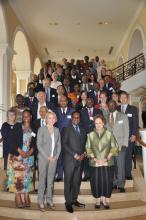No Child Left Behind – Task Force on Immunization Urges the African Region to Strengthen Routine Immunization Systems
ADDIS ABABA | 3 June - The Task Force on Immunization (TFI) met in Ethiopia from 30 June to 1 July to review the progress made in improving immunization in the African region and to strategize for the future. The TFI is the principal technical advisory group to the World Health Organization’s Regional Office for Africa (WHO AFRO) on overall regional policies and strategies related to vaccines and immunization.
The two day meeting was attended by several Global EPI partners and the Federal Ministry of Health of Ethiopia.
“The increased access to new vaccines is contributing to the reduction of child mortality in the Africa region, but the gains remain fragile. We must sustain our achievements through strong immunization systems within resilient national health systems,” Dr Pierre M’pele-Kilebou, WHO Representative to Ethiopia, stressed at the meeting.
The international advisory group, which consists of senior experts in immunization and is chaired by Professor Helen Rees from University of the Witwatersrand in Johannesburg, concluded that the African region must make use of the polio “legacy” and lessons learnt to strengthen efforts to eliminate other vaccine preventable diseases like measles and rubella.
“Prevention, rather than treatment, of infection through immunization is one of the safest and least expensive methods to avoid unnecessary child death,” said Ms Gillian Mellsop, UNICEF Representative to Ethiopia, at the opening of the TFI meeting in Addis Ababa on 30 June 2015.
A key message that came across during the meeting was that health systems need to be strengthened and routine immunization improved in order to sustain gains made and improve child survival interventions.
On 2 July 2015, a delegation led by Mr Moulid Hayir, Vice President of the Somali Regional Government, traveled to Dollo Zone, Somali Region to attend the opening of an advocacy forum on routine immunization and health systems strengthening to sustain polio eradication. The delegation was composed of Dr. Ephrem Tekle, representing the Federal Ministry of Health; Dr Pierre M’pele-Kilebou, WHO Representative; Professor Helen Rees, TFI Chairperson; Dr Jean-Marc Olivé, Horn of Africa Polio Technical Advisory Group Chairperson; Professor Daniel Tarantola, Chairperson of the TFI Increasing Coverage sub-group; and Mr Mohamed Hacen, Chairperson of the TFI Country Ownership sub-group; Dr Sam Okiror, Horn of Africa Polio Eradication Coordinator, Jonathan Shadid, UNICEF West and Central Africa Regional Office; Dr Tadesse Alemu, Chairperson of the Rotary National Polio Plus Committee; Dr Fiona Braka, EPI Team Leader, WHO Ethiopia; Liya Wondwossen, Ethiopian EPI Case Team Leader and Dr Abdifatah Said, Deputy Head of the Somali Regional Health Bureau.
The Advocacy Forum in Dollo Zone brought together key EPI stakeholders in the previously infected outbreak zone including religious and clan leaders, Women groups and partners, to discuss the lessons learned, and to understand, articulate and define their role in health systems strengthening and the improvement of routine immunization to sustain the achievements of polio eradication.
The resounding message at the Advocacy Forum was that as we mark the interruption of polio in Somali Region and Ethiopia, we should be more vigilant in our joint efforts to strengthen health systems to ensure improved immunization. Only through this, the Forum confirmed, can the victory over polio be sustained and subsequent victories against other vaccine-preventable diseases be obtained.
The Forum acknowledged the commitment and hard work of the 36,000 women health workers and the 3 million women health development army towards achieving the interruption of polio virus transmission in Ethiopia.
Expressing her appreciation of the contributions of all the players on the ground, Proffesor Rees said at the opening of the Forum in Warder, Dollo Zone, “It is very impressive and encouraging to witness communities engaging like this to seek the way forward in the fight against polio.”
Africa has made commendable progress in polio eradication; polio is more tightly confined than ever before. The WHO African Region had a record low 17 confirmed cases in 2014 down from 80 cases in 2013; and it has been over 11 months since the last case was confirmed in the Region. Transmission has been interrupted in Ethiopia following the Horn of Africa outbreak; it has been 17 months since the last case was detected in Ethiopia. The gains remain fragile but the job must be finished, and the achievements sustained through strong immunization systems within resilient national health systems.
For more information, please contact
Fiona Braka,
Maternal, Neonatal and Child Health and Nutrition
Email: %20brakaf [at] who.int (brakaf[at]who[dot]int)
Tel: (+251) 911 200 765
Loza Mesfin Tesfaye
Communications Officer
Email: %20tesfayel [at] who.int (tesfayel[at]who[dot]int)
Tel: (+251)911 144 194
Viivi Erkkilä
Communications, Partnership and Resource Mobilization
WHO Ethiopia
Email: %20erkkilav [at] who.int (erkkilav[at]who[dot]int)
Tel: (+251) 11 553 4777
Photo: WHO/V. Erkkilä & Loza Mesfin Tesfaye








